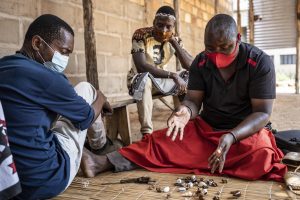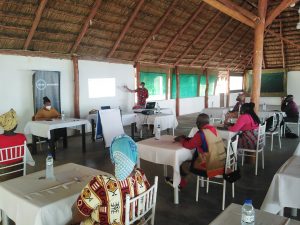
According to data from the Mozambique Ministry of Health, at least 80% of the population uses “traditional medicine” as an alternative to primary health care. Too often, more attention is paid to the strength of ancestral spirits than to the preventative advice of health centres.
In many areas, visual impairments and blindness are associated with witchcraft and socio-spiritual explanations, considering them spells perpetrated by relatives, neighbours, or acquaintances. According to these beliefs, blindness could result from losing spirit protection, vengeful action for breaking the rules, or an ancestor spirit attempting to communicate with the family.
People who believe in these myths, when they have vision problems, go to healers whose abilities are attributed to alternate therapies using hot cloths, roots, plants, or even more dangerous ones using scrapes with blades and sharp objects, which could cause irreversible damage. Turning to these practices only delays conventional care, and patients go to the hospital with their pathology in an advanced state or irreversible blindness.

As the objective of any medicine is to save lives and the well-being of people, important awareness and information work is necessary. In this sense, Eyes of the world carries out training campaigns for traditional medicine professionals to promote education on issues related to eye health and combat practices which are harmful to eyesight.
During the last training in November 2021 in Maxixe, 15 traditional medicine practitioners participated, 12 women and three men. They were provided with technical and scientific explanations, information about the anatomy of the eye, the symptoms of the main eye pathologies to identify them, and, most importantly, the real causes that bring these pathologies on. So, when they detect a similar ocular problem, they do not carry out harmful therapies but instead recommend that their patients go to the ophthalmologic consultation of the health center to be attended by specialized professionals.
This activity was carried out with the framework of the Eyes of Mozambique project, with the support of the Catalan Agency for Development Cooperation (ACCD) and the Government of Navarre.